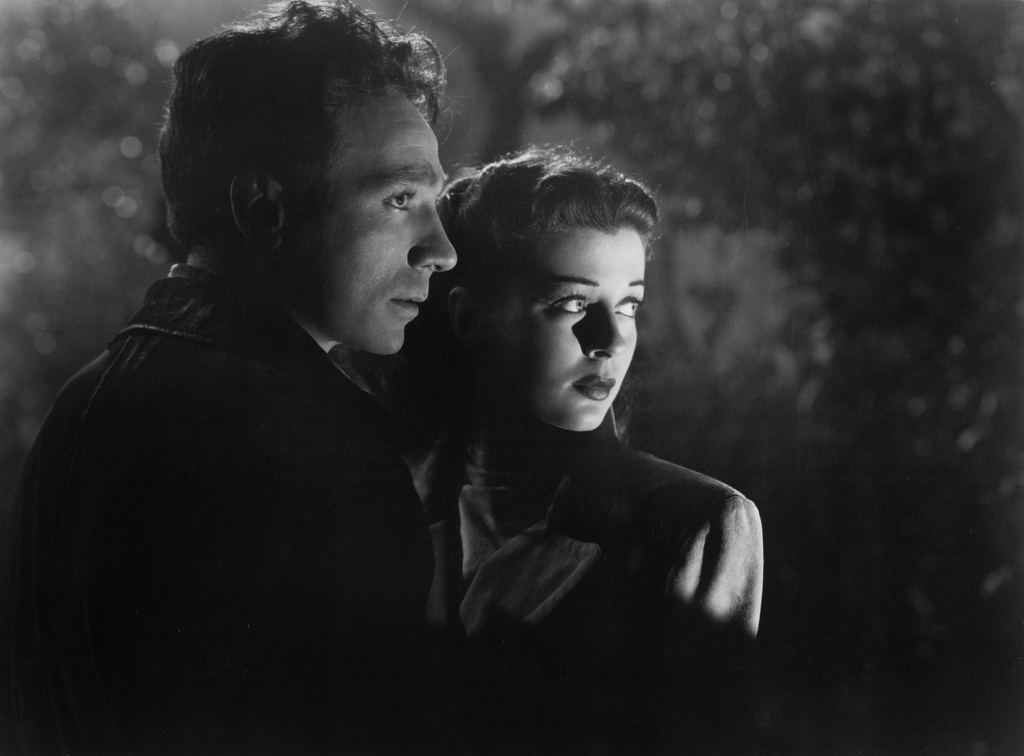When discussing mainstream noir directors, we tend to forget about Frank Borzage, who absorbed the style and substance of German Expressionist filmmakers and imported them to the US in his noirs. His 1948 film Moonrise is a unique noir in style and subject, evading a total condemnation of an apparent murderer as it delves deep into his psyche and the way his society shaped him.

The film begins with the execution of the father of Danny Hawkins (Dane Clark) for murder. As Danny grows up, he’s subjected to constant torment by schoolmates and townspeople who believe that the father’s violence has somehow transferred itself to the son. This culminates in the murder of one of Danny’s childhood tormentors, Jerry Sykes (Lloyd Bridges), when the pair get into a fight over Danny’s interest in Jerry’s fiancée Gilly (Gail Russell). Tormented by guilt and terrified of discovery, Danny tries to evade capture and condemnation while falling more deeply in love with Gilly and slowly coming to terms with what he believes is his family curse.
Moonrise establishes Danny as a tortured but unlikable protagonist who pursues Gilly with a single-mindedness that ignores her desires. After killing Jerry, he crashes a car that nearly kills Gilly and two of their friends, then tries to force his attentions on Gilly when she rejects him. But the longer we spend with Danny, the more we come to understand him and the way that he has internalized his father’s crime and allowed it to shape his personality, partially because the town has forced him to and partially as a result of his own neuroses. He isolates himself from the life of the town, reinforcing all the worst ideas about him and his lineage. His closest friend is Mose (Rex Ingram), who lives an equally isolated existence down near the swamp, where he raises dogs and takes men hunting for raccoons. Mose attempts to help Danny understand that his fate cannot be shaped by his past and that choosing to remove himself from human society to avoid being hurt is the worst crime a man can commit. Although Mose does occupy that position of the conscience of the white protagonist, he’s a blessedly complete character (thanks to the script and to Ingram’s performance) who otherwise evades stereotyping.
Borzage brings that famously Expressionist sensibility to the American South with Gothic results that would have made Flannery O’Connor proud. The film drips with steam and sweat, the nearness of the swamp and the dustiness of the land interacting with and forming Danny’s psyche. As the distortion of his world increases, Danny begins to deal with his crime and the crime that has informed his entire life. The threat of the discovery of Jerry’s body hangs over most of the film, but by pushing that discovery till quite late, Borzage is able to focus on Danny’s increasing paranoia and the development of his character. The film is as much about Danny’s coming to terms with his own part in “becoming” his father as it is about the investigation of the murder.
Borzage accomplishes a unique feat in noir filmmaking with Moonrise: rather than fate determining the outcome, Danny has to choose to take control of his own life, accepting what he’s done and the consequences of it, or risk going down the same road as his father.
Moonrise is streaming on Kanopy and the Criterion Channel.
FOLLOW US ON: FACEBOOK, TWITTER
WANT TO SUPPORT ORIGINAL CONTENT CREATED BY WOMEN? THEN CONSIDER SUPPORTING CITIZEN DAME ON PATREON!
Interested in contributing your writing (either pre-written or original) to Citizen Dame? Consider joining our guest contributor program

